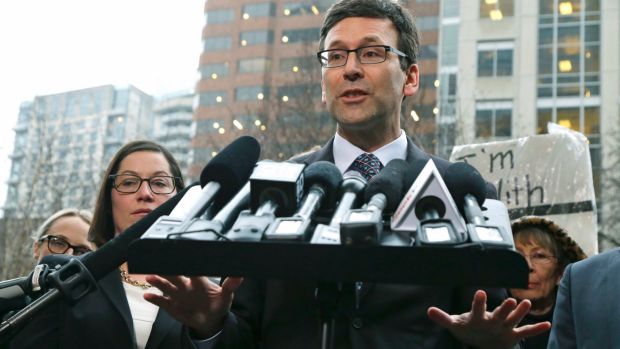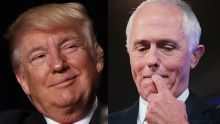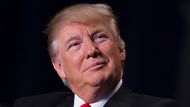Seattle: A federal judge in Seattle, Washington, has granted a nationwide temporary restraining order blocking US President Donald Trump's recent executive order barring nationals from seven countries from entering the United States.
US District Judge James Robart's order represents a major challenge to the Trump administration, which is expected to immediately appeal. He declined to stay the order, suggesting that travel restrictions could be lifted immediately. He said the state had demonstrated the ban could cause "immediate and irreparable injury".
More World News Videos
Tech takes on Trump legally
Tech companies such as Google, Netflix and Airbnb plan to meet to discuss an amicus brief to back a lawsuit challenging President Trump's order curbing immigration.
Washington Attorney-General Bob Ferguson who obtained the order immediately tweeted "No one is above the law - not even the President".
“No one is above the law — not even the President.” –BF
— WA Attorney General (@AGOWA) February 3, 2017
Within three hours the White House said it intended to file an emergency stay of the order it believes to be "lawful and appropriate".
The challenge was brought by the state of Washington and later joined by the state of Minnesota. Robart ruled that the states have legal standing to sue, which could help Democratic attorneys general take on Trump in court on issues beyond immigration.
The two states won a temporary restraining order while the court considers the lawsuit, which says key sections of Trump's order are illegal and unconstitutional.
"Washington has a profound interest in protecting its residents from the harms caused by the irrational discrimination embodied in the order," Ferguson said in a brief.

Federal attorneys had argued that Congress gave the president authority to make decisions on national security and admitting immigrants.
"It's a wonderful day for the rule of law in this country," said Washington state solicitor general Noah Purcell.

The decision came on a day that attorneys from four states were in courts challenging the ban. Trump's administration justified the action on national security grounds, but opponents labelled it an unconstitutional order targeting people based on religious beliefs.
Shortly after the ruling, US Customs and Border Protection told airlines they could board travellers affected by the ban.

The US State Department was working with the Department of Homeland Security to work out how Friday's ruling affects its operations, a spokesman told Reuters, and will announce any changes affecting travelers as soon as information is available.
Earlier on Friday, a federal judge in Boston on Friday declined to extend a temporary restraining order that allowed some immigrants into the United States from certain countries despite being barred by US President Donald Trump's recent executive order.

Also on Friday, US District Judge Leonie Brinkema in Alexandria, Virginia, ordered the White House to provide a list of all people stopped from entering the United States by the travel ban.
The State Department said on Friday that fewer than 60,000 visas previously issued to citizens of Iran, Iraq, Libya, Somalia, Sudan, Syria and Yemen had been invalidated as a result of the order. That disclosure followed media reports that government lawyers were citing a figure of 100,000.

The state of Hawaii on Friday joined the challenge to the order, filing a lawsuit alleging that the order is unconstitutional and asking the court to block the order across the country.
The new Republican President's order signed on January 27 triggered chaos at airports last weekend. Some travellers boarding US-bound flights were turned back, crowds of hundreds of people packed into arrival areas to protest and legal objections were filed across the US.
The order also temporarily stopped the entry of all refugees into the country and indefinitely halted the settlement of Syrian refugees.
On Friday the Department of Homeland Security issued additional clarification of the order, stating that there were no plans to extend it beyond the seven countries. The DHS also reiterated that the ban did not apply to permanent residents, or green card holders, and some others, such as those who have helped the US military.
The block comes as it's been revealed a former prime minister of Norway - a US ally - was detained in Washington this week because he had taken a trip to Iran in 2014.
Kjell Magne Bondevik, an ordained Lutheran minister travelled to the US for the National Prayer Breakfast event headlined by Trump on Thursday. He has travelled to and from the US on numerous occasions.
His office contacted the US Embassy in Oslo prior to him travelling, and was told his passport and a separate electronic travel authorisation - a visa waver - would be enough for entry into the country.
But after flying into Dulles International Airport Tuesday afternoon, he was detained and questioned for about an hour. His passport - which clearly stated he is the former prime minister of Norway - indicated he been to Iran, where Bondevik said he had attended a human rights conference.
"I was surprised, and I was provoked," he told WJLA ABC7. "What will the reputation of the US be if this happens not only to me, but also to other international leaders?"
Bondevik contacted the Norwegian Embassy in Washington after he was detained, he said. A spokesperson said the embassy was "happy that things were sorted out."
He was placed in a room with travellers from the Middle East and Africa who also faced extra scrutiny, and had to wait for about 40 minutes before being questioned for about 20 minutes, he said. Officials asked him why he had been in Iran and why he was coming to the US, he told Norway's TV2, according to English-language news outlet the Local.
"There should be no reason to fear a former prime minister who has been on official visits to the country several times before," Bondevik said. "It appears that when the name of a certain country shows up, all of the antennas go up. This will create totally unnecessary suspicion."
Bondevik said his detention was prompted not by President Donald Trump's recent executive order, but by a policy instated under President Obama, which calls for extra restrictions on some citizens from 38 countries - including Norway. Exemptions for travel for diplomatic or military purposes exist.
Still, Bondevik was shocked, he said, particularly because this was not his first visit to the US since his trip to Iran in 2014. A spokesperson with US Customs and Border Protection said the agency is prohibited by privacy laws from discussing specifics of any individual's admissibility review," ABC7 reported.
"I understand the fear of terror, but one should not treat entire ethnic groups in such a way," he said, the Local reported. "I must admit that I fear the future. There has been a lot of progress over the last 10 years, but this gives great cause for concern, in line with the authoritarian leaders we see controlling other major countries."
Bondevik served as the Christian Democratic Party prime minister of Norway from 1997 to 2000 and from 2001 to 2005, making him Norway's longest serving non-Socialist prime minister since World War II.
Reuters, Washington Post















56 comments
New User? Sign up